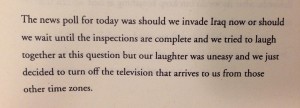This past week in ASTU, we have read and discussed Juliana Spahr’s book of poems, This Connection of everyone with lungs. Spahr’s writing style has aspects of conventional lyric poetry such as personal narration and the use of aesthetically pretty language, but the uniqueness of her poetry lies in its hypnotic and soothing quality. Even though the content of the later poems in the book touch on heartbreaking and tragic events, to me they still had the calmness that a lullaby would have. Her ability to incorporate these very real tragedies and juxtapose them with the romantic nature of a lyrics poem interested me because it almost feels unnatural. Yet, I think her style mimics our reality in terms of how we, as well as news broadcaster, often deal with world tragedies.

A passage from page 25 of This Connection of Everyone with Lungs
Spahr’s use of “I” throughout her poems seems more like a seeing-all and knowing-all collective entity rather than a single individual. Due to this, to me her narration resembles a news anchor, or some sort of internet database that is spewing out the latest news topics in a slightly erratic, but nonetheless nonstop form, similar to a Facebook newsfeed. Typically, news headlines reduce tragic events to statistics and factual descriptions. But I think by personifying these headlines though repeating phrases such as “I speak”, “I wake up”, and “I hear”, it gives them a slightly more haunting and hard hitting perception than if the reader were simply scrolling through their newsfeed. Even the structure of Spahr’s poetry embodies news coverage in modern media. The scope and variety of the events that she covers, as well as how as she jumps quickly to new events, is similar to the nature of news contemporary media in that the reader spend a few minutes, or even seconds, skimming over them and then promptly moves on to the next story. This also relates to how Spahr mimics the nature of our current ‘trending’ media culture where celebrity gossip tends to receive equal, if not more, of the public’s attention than tragic instances like warfare in the Ivory Coast, or the rapid melting of Arctic glaciers. Overall, by adding a personalized voice to these headlines I think Spahr is challenging the idea that reading a headline on your iPhone about a bombing incident thousands of miles away should make you feel isolated or removed from these events. And it challenges the role that distance may play when sympathizing or reflecting on foreign tragedies, as a running theme in her book is that of connection, that we all breathe the same air, and that “our bed is a part of everyone else’s bed” (30). I think the value of our innate connection with others in this world is often lost through the robotic and cold nature of a much of our media, and Spahr challenges the isolation that we often feel because of our that. Of course, this is a lot easier said than done, as engaging in the stories behind all foreign tragedies would would be exhausting and overwhelming. However, Spahr’s point of view can make us question the nature of the headlines that we come across daily, and cause is to look more closely at how we choose to engage with them.
Thanks for reading and I’d love to hear your thoughts on Spahr’s poetry!
Works Cited:
Spahr, Juliana. This Connection of Everyone with Lungs: Poems. Berkeley: U of California, 2005. Print.